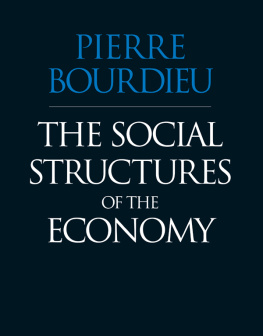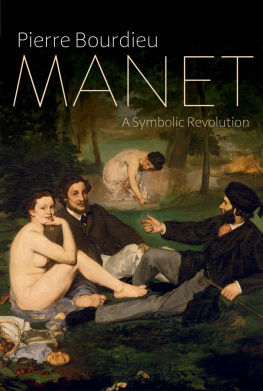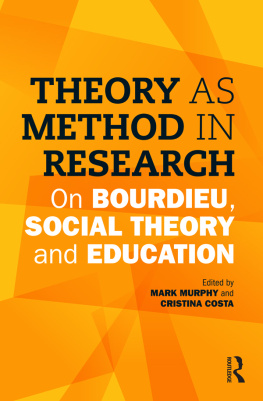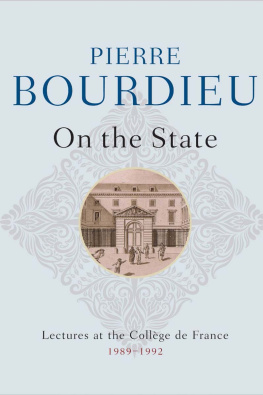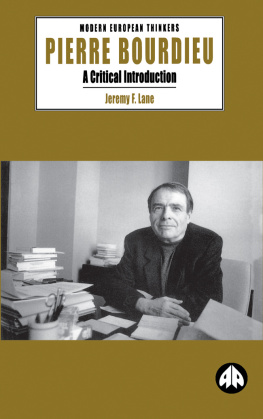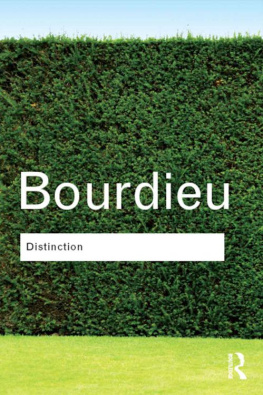Bourdieu Pierre - The spatial logic of social struggle: a Bourdieuian topology
Here you can read online Bourdieu Pierre - The spatial logic of social struggle: a Bourdieuian topology full text of the book (entire story) in english for free. Download pdf and epub, get meaning, cover and reviews about this ebook. City: Lanham, year: 2011, publisher: Lexington Books, genre: Science. Description of the work, (preface) as well as reviews are available. Best literature library LitArk.com created for fans of good reading and offers a wide selection of genres:
Romance novel
Science fiction
Adventure
Detective
Science
History
Home and family
Prose
Art
Politics
Computer
Non-fiction
Religion
Business
Children
Humor
Choose a favorite category and find really read worthwhile books. Enjoy immersion in the world of imagination, feel the emotions of the characters or learn something new for yourself, make an fascinating discovery.

- Book:The spatial logic of social struggle: a Bourdieuian topology
- Author:
- Publisher:Lexington Books
- Genre:
- Year:2011
- City:Lanham
- Rating:5 / 5
- Favourites:Add to favourites
- Your mark:
- 100
- 1
- 2
- 3
- 4
- 5
The spatial logic of social struggle: a Bourdieuian topology: summary, description and annotation
We offer to read an annotation, description, summary or preface (depends on what the author of the book "The spatial logic of social struggle: a Bourdieuian topology" wrote himself). If you haven't found the necessary information about the book — write in the comments, we will try to find it.
The spatial logic of social struggle: a Bourdieuian topology — read online for free the complete book (whole text) full work
Below is the text of the book, divided by pages. System saving the place of the last page read, allows you to conveniently read the book "The spatial logic of social struggle: a Bourdieuian topology" online for free, without having to search again every time where you left off. Put a bookmark, and you can go to the page where you finished reading at any time.
Font size:
Interval:
Bookmark:
The Spatial Logic of Social Struggle
Social Struggle
A Bourdieuian Topology
Nikolaus Fogle

Published by Lexington Books
A division of Rowman & Littlefield Publishers, Inc.
A wholly owned subsidiary of The Rowman & Littlefield Publishing Group, Inc.
4501 Forbes Boulevard, Suite 200, Lanham, Maryland 20706
http://www.lexingtonbooks.com
Estover Road, Plymouth PL6 7PY, United Kingdom
Copyright 2011 by Lexington Books
All rights reserved. No part of this book may be reproduced in any form or by any electronic or mechanical means, including information storage and retrieval systems, without written permission from the publisher, except by a reviewer who may quote passages in a review.
British Library Cataloguing in Publication Information Available
Library of Congress Cataloging-in-Publication Data
Fogle, Nikolaus, 1981
The spatial logic of social struggle : a Bourdieuian topology / Nikolaus Fogle.
p. cm.
Includes bibliographical references and index.
ISBN 978-0-7391-4927-0 (cloth : alk. paper)
1. SpaceSocial aspects. 2. Social conflict. 3. Bourdieu, Pierre, 19302002. I. Title.
HM654.F44 2011 | |
304.2'3dc22 | 2010051621 |
 The paper used in this publication meets the minimum requirements of American National Standard for Information SciencesPermanence of Paper for Printed Library Materials, ANSI/NISO Z39.48-1992.
The paper used in this publication meets the minimum requirements of American National Standard for Information SciencesPermanence of Paper for Printed Library Materials, ANSI/NISO Z39.48-1992.
Printed in the United States of America
For Jen, my love.
An inveterate multidisciplinarian, Pierre Bourdieu once described his scholarly activity as fieldwork in philosophy. Few people realize that Bourdieu in fact began his career as a philosopher, receiving his agrgation from the cole Normale Suprieure in philosophy with a translation and commentary of Leibniz Animadversiones. Knowing this, his propensity to transform his empirical work through a persistent engagement with high theory, his tendency to invoke Wittgenstein and J. L. Austin as often as Durkheim and Marx, begins to seem slightly less strange. And despite the fact that he felt intensely uncomfortable in the role of the philosopher, condemning overly detached and rationalistic discourse as a form of symbolic violence, there is little in Bourdieus work that is not suffused with a passion for philosophical questioning. This fact only serves to highlight the exceptionality of his achievement, as sociologists and anthropologists will confess to finding his contributions to their fields at times confoundingly abstract, and as philosophers, while appreciative of texts like the Pascalian Meditations, have difficulty placing him in relation to their own field, he nonetheless commands enormous respect from all quarters. He seems, in short, to have created a unique brand of intellectual capital, flexible enough to serve as common coin for a large assortment of scholars and researchers, but at the same time absolutely singular and inimitable, a phenomenon that, as Richard Shusterman has remarked, he would have difficulty explaining within his own system.
This work tries to achieve nothing so remarkable, but it does share the motivating vision of fieldwork in philosophy. The aim is to learn something, even if only something small, by drawing together two disparate phenomena, or rather, phenomena that in their long and forgetful history have begun to seem disparate. The two phenomena are social space and physical space; the one, a way of relating facts and ideas in thought, and sometimes also of representing them on paper; the other, simply the environment we find ourselves in most immediately and most concretely, including our streets, our cities and our homes. Of course, much has been written about the apparently infinite number of ways in which these two objects are related to one another, and it would be folly to suppose that a single, small study such as the one before you now could make much headway toward illuminating these. What I do want to suggest, though, is that the theoretical framework that Bourdieu developed provides the best road thus far sighted that could lead to a coherent synthesis of physical and representational space. Moreover, following the Bourdieuian road in this endeavor allows us to relate social space and physical space to one another in a way that preserves the fundamentally agonistic character of each, since there is nothing about the social order, nor about cities or architecture, that stands outside of struggles for power. In the following pages I assemble the elements of Bourdieus social field theory, as well as his more scattered insights about the nature of physical space, and explain how we can understand their mutual interaction within the letter of Bourdieus theory. And in the spirit of doing fieldwork in philosophy, I attempt to look at the models produced by social science, as well as at buildings and places, without losing sight of the conviction that, as separate as they may seem, they are fundamentally derived from one another.
This book is about the philosophy of space that emerges from the way Bourdieu theorizes social space on the one hand, and physical space on the other. Some confusion is bound to arise due to the fact that both of these elements also admit of an important internal division, between their objective and subjective versions. Ultimately, the subjective and the objective are intimately linked in Bourdieus concepts, but in order to see how this is so, it is necessary at first to hold them apart. If we focus, for instance, on Bourdieus conceptualization of social space, we see that it is both an objective model of social relations and a subjective vision of the social world. In the first case it is something that can be fixed upon empirically, by collecting data and turning that data into a visual representation that can be drawn on paper. In the second, it is an experienced environment, the place referred to when he defines habitus as a sense of place, and thus an object for phenomenology. Bourdieu endows social space with this Janus-faced character precisely because it breaks down the dichotomy between objectivist and subjectivist perspectives on the worldit links science with life, and thus generates the reflexive turns, the shifts in point of view, that Bourdieu insists are vital for a theoretical practice that does not fall into error. In conceiving of social space this way Bourdieu also creates a new kind of philosophical object, one that points the way toward a sophisticated philosophy of space and our relation to it.
The philosophy of space we find in Bourdieu owes much of its subtlety to the tradition of spatial thought in the social sciences, which includes such figures as Claude Levi-Strauss, Louis Althusser and Lucien Goldmann (see Appendix). It also owes a great deal to the philosophical tradition. Bourdieus use of space as a means to facilitate relational thinking, for instance, has its origin in Ernst Cassirers philosophy of science, which demonstrates that as science progresses from the study of distinct phenomena toward a state of systematic coherence, its real object shifts from individual substances to relations between substances. As a scientific model, then, Bourdieu thinks of space as a relational framework. His understanding of the geometric nature of space, furthermore, results from his study of Leibniz conception of
Next pageFont size:
Interval:
Bookmark:
Similar books «The spatial logic of social struggle: a Bourdieuian topology»
Look at similar books to The spatial logic of social struggle: a Bourdieuian topology. We have selected literature similar in name and meaning in the hope of providing readers with more options to find new, interesting, not yet read works.
Discussion, reviews of the book The spatial logic of social struggle: a Bourdieuian topology and just readers' own opinions. Leave your comments, write what you think about the work, its meaning or the main characters. Specify what exactly you liked and what you didn't like, and why you think so.

